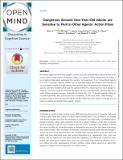Dangerous Ground: One-Year-Old Infants are Sensitive to Peril in Other Agents’ Action Plans
Author(s)
Liu, Shari; Pepe, Bill; Ganesh Kumar, Manasa; Ullman, Tomer D; Tenenbaum, Joshua B; Spelke, Elizabeth S; ... Show more Show less
DownloadPublished version (2.431Mb)
Publisher with Creative Commons License
Publisher with Creative Commons License
Creative Commons Attribution
Terms of use
Metadata
Show full item recordAbstract
<jats:title>Abstract</jats:title>
<jats:p>Do infants appreciate that other people’s actions may fail, and that these failures endow risky actions with varying degrees of negative utility (i.e., danger)? Three experiments, including a pre-registered replication, addressed this question by presenting 12- to 15-month-old infants (N = 104, 52 female, majority White) with an animated agent who jumped over trenches of varying depth towards its goals. Infants expected the agent to minimize the danger of its actions, and they learned which goal the agent preferred by observing how much danger it risked to reach each goal, even though the agent’s actions were physically identical and never failed. When we tested younger, 10-month-old infants (N = 102, 52 female, majority White) in a fourth experiment, they did not succeed consistently on the same tasks. These findings provide evidence that one-year-old infants use the height that other agents could fall from in order to explain and predict those agents’ actions.</jats:p>
Date issued
2022Department
Massachusetts Institute of Technology. Department of Brain and Cognitive SciencesJournal
Open Mind
Publisher
MIT Press
Citation
Liu, Shari, Pepe, Bill, Ganesh Kumar, Manasa, Ullman, Tomer D, Tenenbaum, Joshua B et al. 2022. "Dangerous Ground: One-Year-Old Infants are Sensitive to Peril in Other Agents’ Action Plans." Open Mind, 6.
Version: Final published version